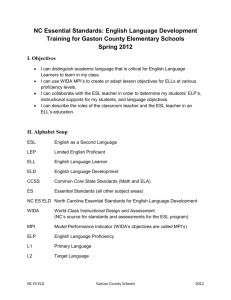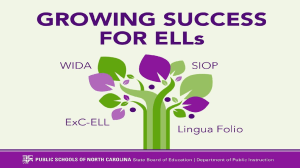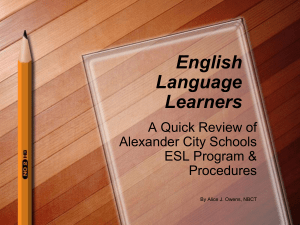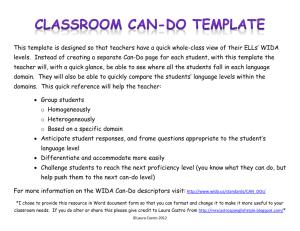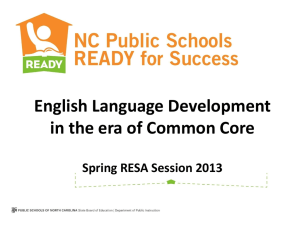Document 10823232
advertisement
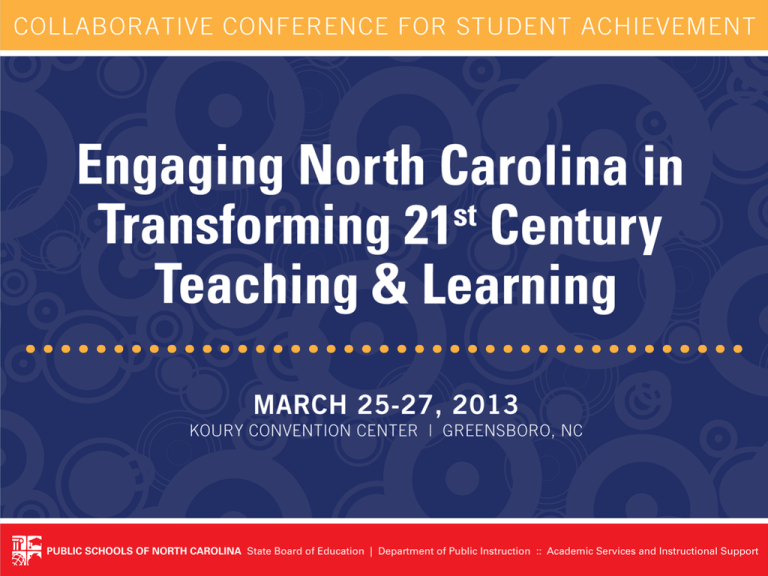
English Language Development in the Era of Common Core CCSA March 25-27, 2013 Agenda - Welcome and Introduction - CCSS ELA/WIDA ELL Project Overview - Getting Familiar with MPIs - Review and Feedback on NC-Created MPIs Introductions Tell us about yourself! • Name • LEA • Position • Common Core English Language Arts and ELL Connection in your LEA Goals for CCSA Session • • • • Provide overview of CCSS/WIDA Project. Familiarize with MPIs. Elicit feedback on project deliverables. Determine how to apply new knowledge in LEAs. WIDA/CCSS ELA MPIs Task Force • WIDA/CCSS ELA Task Force • Creating MPIs based on CCSS ELA Objectives • Grades Covered – K, 1, 3, 5, 6, 7, 8, 9-10, 11-12 • New Task Force membership invitation Timeline October 12, 2012 October – December, 2012 December 18 – 19, 2012 January 11, 2013 February – March, 2013 April – August, 2013 September 30, 2013* On-going Initial Meeting Pre-Work Webinars (Resources Sharing) MPI Writing MPI Writing (ELA Partnership) Vetting Process (RESA & CCSA) MPI Revisions and Writing Items Released Feedback from the field * This date may be subject to change. WIKI Resources compiled from • • • • • Aspen Institute Council of Great City Schools WIDA 2012 WIDA Debut Conference DPI Disciplinary Literacy Online Module Getting Familiar with MPIs Organization of MPIs within Standards Example: Social & Instructional; Grades 6-8 Organization of MPIs within Standards MPI STRAND Model Performance Indicators Language Function Support Make lists of real-world examples of threedimensional shapes from labeled models Standard 3: The language of Mathematics Grade Level Cluster: 3-5 The Content Stem/Topic Model Performance Indicators • Provide examples (models) of assessable language skills. • Reflect the second language acquisition process. • Describe how students can use the language (purpose). • Relate to specific criteria and elements of academic language. • Provide the anchors for curriculum, instruction, and assessment. WIDA Consortium The MPI: Language Function Language Function • Describes how language is used; not the cognitive task • Guides the language features that students should recognize or be able to produce • May be used across several different levels, though the language features associated at specific levels may be different WIDA Consortium The MPI: Content Stem Content Stem • Helps ground language instruction to the content that students are learning • Relates to state or local content standards • Is grade level appropriate WIDA Consortium The MPI: Support or Strategy Support or Strategy • May be visual, graphic or interactive • Are based on the concept of scaffolding new language and concepts • May include use of languages other than English • Are appropriate for instruction or assessment WIDA Consortium Language Function Language Function = “Describe” Content Stem Content Stem/Example Topic = “objects of the earth or sky” Support or Strategy Support = “from observation, photographs or models” Elements of MPI Getting Familiar with MPIs – Station 1 Place the written MPIs in order under the appropriate language domains Transformation of MPI WIDA Consortium / CAL / Language Functions Across Proficiency Levels Grade level cluster 1-2 Use words or phrases related to weather from pictures or photographs Language Functions Across Proficiency Levels Grade level cluster 1-2 Make statements about weather from pictures or photographs Language Functions Across Proficiency Levels Grade level cluster 1-2 Ask questions about weather from pictures or photographs Language Functions Across Proficiency Levels Forecast weather and provide reasons from pictures or photographs Grade level cluster 1-2 Language Functions Across Proficiency Levels Grade level cluster 1-2 Evaluate and weigh options related to weather forecasting Change in Function Grade Level: 1-2 Standard: 5 Language Domain: Writing (From Compare to Evaluate) Compare attributes of two products in the marketplace from illustrated examples Evaluate attributes of two products in the marketplace from illustrated examples WIDA Consortium Change in Content Grade Level: 6-8 Standard: 4 Language Domain: Reading (From Cycles/Processes to Ecosystems) Predict consequences of alteration of cycles or processes from grade-level text Predict consequences of alteration of ecosystems from grade-level text WIDA Consortium Change in Support Grade Level: 6-8 Standard: 4 Language Domain: Speaking (From with a partner to based on graphic support or pictures) Outline steps of scientific inquiry involving elements or compounds with a partner Outline steps of scientific inquiry involving elements or compounds based on graphic support or pictures WIDA Consortium Transform Multiple MPI Elements Example Topics Level 1 Entering Speaking WIDA Consortium Level 3 Developing Level 4 Expanding Level 5 Bridging Describe historical figures or events associated with the 2008 Presidential Election from photographs, illustrations, or videos in small groups Role-play scenes from historical events or lives of figures associated with the 2008 Presidential Election in small groups Re-enact historical events or lives of figures associated with the 2008 Presidential Election from varied perspectives with peers (e.g., presidential debates) Give monologues simulating historical events or figures associated with the 2008 Presidential Election (e.g., scenes in plays) Level 6- Reaching Identify historical figures or events associated with the Language Function2008 Presidential Election from Content Stem photograph s or illustrations Supports in small groups 2008 USA Presidenti al Election Level 2 Beginning WIDA Checklist for Reviewing Strands of MPIs WIDA Getting Familiar with MPIs – Station 2 Create MPIs by completing the table. Review and Feedback on NC-Created MPIs Provide feedback on project deliverables Description Suggested Usage Questions Suggested Modifications Comments/ Possible Resources Next Steps MPI Transformation in Action AP Engineering created by a High School CTE teacher #4 (Writing) Explain and justify which scientific invention has been the most useful by writing a comic to support your ideas (i.e., next slide). Standards Reference: Framework: Summative Standard 4: The language of Science Science Standard: Grades (6-8): Intro to Engineering Design Standard: 2.4 Advanced Designs (9-12) Grade level cluster: 6-8 Language domain: Writing English language proficiency level: 1- Entering Example Topic: Scientific Inventions or discoveries Comic Writing Activity Students will choose an invention from the following list, or one of their own they feel is the most important. The students will then create a comic to represent its importance. Students at level 1 may not have many words in their comic, but they will be able to express themselves through pictures. The teacher may also help this process by asking questions like, “What does this invention do?” “Has this invention helped anything else?” The teacher may then go back and have them add words to their comics. Teachers may also include words that describe inventions for the students to use in their comics. 1. Microscope 2. medicine 3. X-Ray machine 4. telescope 5. computers 6. the internet 7. plastic 8. airplanes 9. Cars 10.batteries 11. light bulb 12. electricity Higher Level Thinking Follow Up Activity • The students will then have to research the invention they chose for their comic and create and present a power point presentation that defends why it is the most important scientific invention to their classmates. • The students could create an invention that would help solve a typical teenager problem. Debrief and Next Steps • How would you share what you have gained (process/product) with stake holders? – – – – – ESL Teachers Content Teachers Administrators (school-based or central office) Parents Community Members including school board Questions & Answers Resources • WIDA 2012 Amplified Standards & Academic Language Resources • Common Core ELA (Text Complexity) and WIDA Connections • Disciplinary Literacy Resources • Productive Talk about Complex Text (Scrolling PowerPoint Slides) • Drs. Lily Wong Filmore and Charles Filmore http://eldnces.ncdpi.wikispaces.net/Spring+2013+RESA+Regional+Training WIKI Resources compiled from • • • • • Aspen Institute Council of Great City Schools WIDA 2012 WIDA Debut Conference DPI Disciplinary Online Module Goals for CCSA Session • • • • Provide overview of CCSS/WIDA Project. Familiarize with MPIs. Elicit feedback on project deliverables. Determine how to apply new knowledge in LEAs. Presentation Development Charlotte “Nadja” Trez, NCDPI ESL/Title III Office Ivanna Mann Thrower, NCDPI ESL/Title III Office Lindsey Fults, Charlotte Mecklenburg Schools (Resources) Deborah Wilkes, Durham County Schools (Resources) NCDPI WIDA/Common Core Task Force Process Check What worked well? What could be done differently! Contacts Ivanna Mann Thrower ESL/Title III Consultant NC Department of Public Instruction 919-807-3860 ivanna.thrower@dpi.nc.gov Charlotte “Nadja” Trez ESL/Title III Consultant NC Department of Public Instruction 919-807-3866 nadja.trez@dpi.nc.gov ESL Website http://esl.ncwiseowl.org/ Description Suggested Usage Questions Suggested Modifications Comments/ Possible Resources Next Steps CCSS ELA/ELL Task Force
